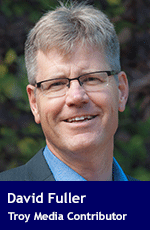Follow these strategies to double your income and reduce your stress

“You just learned in a year what most MBA students never learn in a lifetime,” I once told a client.
He had just responded to my question: “What did you learn in the past year?”
“I learned I can earn more by working less!” he answered.
Not only had my client doubled his income over the past year, but he significantly reduced his stress levels.
You might think that this story is an exaggeration or isn’t possible. How can someone double their take-home pay in just one year?
 |
Here’s the testimonial I received, and it’s similar to what I hear from my clients on a regular basis:
“As the owners of a contracting company with 10 employees, we have been working with Dave for the past year to try to take our business to the next level. As a result of Dave’s coaching, we have doubled the amount of income that we took home this year over the previous year, and our stress levels have dropped significantly,” wrote D and J.
In 2014, one of the professors in my MBA program asked: “Why are you here?”
As he went around the class, many people responded, “to further my career,” “to earn more money,” “to get a better job.” When he came to me, I responded, “I’m here to learn how to work less and make more money.”
There was a gasp of disbelief in the room, and several people said that wasn’t possible. “How can you work less and earn more?”
Earning more and working less is a concept beyond the imagination of most small business owners. Most believe they need to work more to earn more. They’re stuck in the mindset of an hourly employee and, at some levels of business where there’s not enough income to hire people, this is sometimes the case.
But to take our business to that next level, to get to the point where we can work less and earn more, we need to have the right systems and people in place. That will allow us to step back as owners and focus on those things that will really make the company successful.
The challenge for most ‘stuck in the weeds of the business’ owners is their difficulty seeing beyond the day-to-day operations. They fail to have plans that will enable them to increase their margins, generate more sales or develop new markets. Those are the things that might allow them to work less and earn more.
So what did my client do to earn more and stress less?
First, he recognized that what had worked in the past wasn’t working anymore for him and his partner. They needed to think differently about their business since sales were going up but profits were going down. They decided not to focus on sales. Instead, they focused more on profitable business; as a result, their 2018 sales dropped 20 percent but their bottom line doubled.
Second, the partners recognized that they had a great crew of employees and decided to delegate more while keeping their employees more accountable. They began having regular staff meetings that were “uncomfortable “for them at first but improved morale and communication.
These changes enabled them to step back from the day-to-day work and focus more on high-level operations like working on margins and developing client relationships.
Third, they started planning. They developed plans to help them strategically focus their energies and operations.
In the past, like many business owners, they floated from year to year. Now, they had some concrete objectives and guidelines about what they should and shouldn’t do. Since they developed the objectives themselves, they had clarity on what they needed to do to be successful.
Many business owners could earn more if they thought like these clients. Thinking differently, delegating more, and strategically planning are key to earning more and worrying less.
Perhaps it’s time you put these processes into your plans for 2019.
Dave Fuller is a Commercial and Business Realtor, an award-winning business coach, and business author.
For interview requests, click here.
The opinions expressed by our columnists and contributors are theirs alone and do not inherently or expressly reflect the views of our publication.
© Troy Media
Troy Media is an editorial content provider to media outlets and its own hosted community news outlets across Canada.

